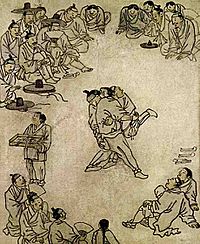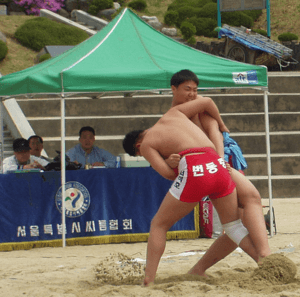Ssireum facts for kids

The painting titled "Sangbak" (상박; 相撲) drawn by Kim Hong-do illustrates people gathering around to watch a ssireum competition in the late 18th century.
|
|
| Also known as | gakjeo; gakhui; gakryeok; gakgii; chiuhui; sangbak; jaenggyo |
|---|---|
| Focus | Grappling |
| Hardness | Full-contact |
| Country of origin | Korea |
| Creator | Unknown |
| Parenthood | Historical |
| Olympic sport | No |
Ssireum, also known as Korean wrestling, is a very old sport from Korea. You can see pictures of it painted on the walls of ancient graves in Korea. This shows how long people have been enjoying this sport!
Ssireum started in Korea. It was often played during special days of "public enjoyment." These were like big festivals or celebrations. Just like in Sumo, the goal is to make your opponent fall. The person who stayed standing until the end was the winner. They were called changsa, which means "the strong man" or "the athlete." The winner often received an ox as a prize!
As Korea became more industrial, Ssireum grew into a professional sport. Today, there are professional teams from colleges and universities. There are also national organizations that hold championships for the changsa title. Many competitions happen all over the country.
Contents
What is Ssireum?
How Do Ssireum Matches Work?
Two fighters compete inside a circle made of sand. Each wrestler wears a special piece of cloth called a "satpa." This cloth is tied around their waist and thighs. Wrestlers use their hands, legs, and backs to try and make the other person fall to the ground.
Most Ssireum wrestlers are about 1.8–2 metres (5 ft 11 in – 6 ft 7 in) tall. They usually weigh between 100–150 kilograms (220–330 lb). Even though the fights might seem slow at first, they are actually very dynamic and exciting!
Who Are Famous Ssireum Wrestlers?
One of the most famous Ssireum sportsmen is Li Man-ki. In the 1980s, he won the changsa title many times. His success helped make the sport even more popular.
Images for kids
See also
 In Spanish: Ssireum para niños
In Spanish: Ssireum para niños
 | Kyle Baker |
 | Joseph Yoakum |
 | Laura Wheeler Waring |
 | Henry Ossawa Tanner |






